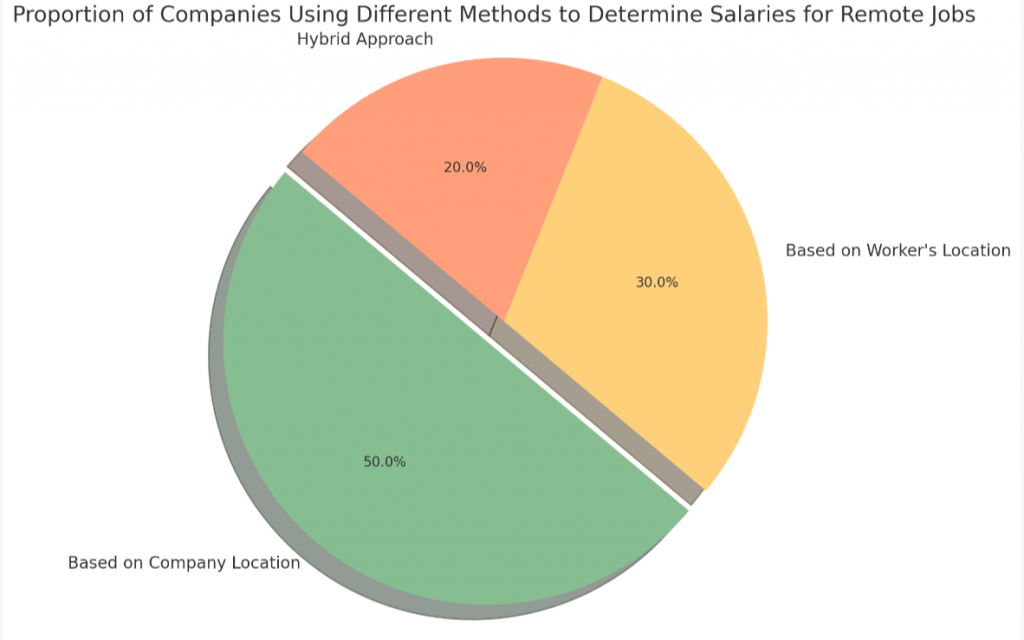Navigating Earnings: A Guide to Salary Expectations in Remote Social Media Jobs
Navigating salary expectations in remote social media jobs can seem like a maze. Interestingly, data reveals that the location of work doesn’t necessarily affect pay scale. This article will guide you through understanding and negotiating your worth in remote roles, offering insights into companies’ pay setting strategies and how to advocate for your desired compensation.
Ready to translate these complexities into a winning negotiation strategy? Let’s dive in!
Key Takeaways
- Remote social media job salaries can be determined based on factors such as company location, remote worker’s location, and general market trends.
- Researching salary ranges for remote social media jobs is important to understand the market value of your skills and experience.
- Responding to the salary expectations question during a remote job interview requires researching average salary ranges, being prepared with a specific range, emphasizing your qualifications, and being open to negotiation.
Understanding How Companies Determine Salaries for Remote Jobs
Companies determine salaries for remote jobs by considering factors such as company location, remote worker’s location, and general market trends.
Salaries Based on Company Location
Some businesses determine remote job salaries based on the location of their headquarters. For example, Chef, a software company, initially sets salary bands according to Seattle’s market rates where they are based.
They consider these pay scales fair for employees in similar or lesser expensive cities. However, an allowance is offered for staff living in costlier areas like London, New York or L.A., ensuring discrepancies due to varied costs of living don’t disadvantage their remote workforce.
This approach creates uniformity while accommodating higher expenses inherent to some locations.
Salaries Based on Remote Worker’s Location
Companies often consider the living expenses in a remote worker’s location when deciding salaries. For instance, if you’re working from an expensive city like New York or London, your salary might be adjusted upward to account for high costs of living.
The rationale is straightforward: workers in pricier areas require higher income levels to maintain a decent standard of living.
Not all companies apply this rule consistently though. Certain firms may opt for hybrid approaches blending national rates with adjustments based on cost variations in different cities.
It’s crucial to understand where your prospective employer stands on this issue as it has direct implications on your compensation package and financial well-being as a remote worker.
Salaries Based on General Market Trends
Companies often turn to general market trends as a compass for setting salaries, irrespective of the teleworker’s location. This trend transcends the remoteness or traditional in-office nature of positions.
Data research becomes crucial here, as it provides insights into average national rates and salary bands that are in harmony with current market trends. Companies like DVMelite have adopted fixed pay ranges applicable to all remote workers while Xerox pays a national rate—taking into account median salary data—to provide fitting compensation for their vast network of remote employees.
By aligning with general market trends, companies can offer attractive salaries competitive with those offered by other industry players.
Researching Salary Ranges for Remote Social Media Jobs
Internet data is a gold mine when researching salary ranges for remote social media jobs. Websites such as PayScale and Salary.com provide accurate information about pay scales in various industries, including digital marketing.
These sites collect data from employees and employers, allowing you to compare salaries across different geographic locations, years of experience, or even job titles. For instance, a Senior Social Media Manager located in San Francisco might earn more than their counterpart in Omaha due to the difference in cost of living between these two cities.
In some cases, companies pay based on general market trends rather than specific geographical location costs. Key examples include Xerox which considers national rate for setting up remuneration while Chef sets salary bands reflecting Seattle’s market rates.
Successful research also entails understanding company-specific compensation policies which come into play during negotiations; Haynes & Company compares salaries and benefits for remote workers with those in traditional office-based positions before finalizing offers.
Taking it a notch further, some remote work platforms like FlexJobs provide salary guides too that are tailored specifically for teleworkers making it easier for them to evaluate potential job offers effectively.
Following this due diligence process allows applicants not only to develop realistic expectations but also equips them with hard facts necessary during negotiation discussions; leading not just towards financial satisfaction but overall career fulfilment as well.
How to Respond to the Salary Expectations Question
Learn effective strategies for answering the salary expectations question during a remote job interview and increase your chances of securing a competitive compensation package.
Why Hiring Teams Ask About Salary Expectations
Hiring teams ask about salary expectations in remote social media jobs because the location of the remote worker plays a significant role in determining their compensation. Companies may base salaries on the general market trends or adjust them based on the cost of living in the remote worker’s area.
By understanding a candidate’s salary expectations, hiring teams can ensure that they are offering a fair and competitive salary for the position. It also allows them to assess whether the candidate’s financial needs align with what they can offer.
Researching potential salary ranges for remote jobs is essential for job seekers to have realistic expectations and negotiate effectively during the hiring process.
Tips for Answering the Salary Expectations Question
- Research average salary ranges for similar remote social media jobs in your industry. This will help you understand the market value of your skills and experience.
- Consider your own financial needs and obligations when determining your salary expectations. Take into account factors such as cost of living, expenses, and any financial goals you may have.
- Be prepared to provide a specific salary range rather than a single number. This allows for more flexibility in negotiations and shows that you have done your research.
- Focus on highlighting your value and qualifications during the salary discussion. Emphasize how your skills and experience align with the job requirements, and why you deserve to be compensated accordingly.
- Avoid discussing your current or previous salary unless specifically asked. Instead, focus on the value you can bring to the role and why you believe you are worth a certain salary range.
- Be confident but also be open to negotiation. Express that you are willing to consider other factors besides just salary, such as benefits or flexible work arrangements, if they are important to you.
- Stay professional and avoid getting defensive if the hiring team pushes back on your salary expectations. Instead, ask for their reasoning behind their offer and engage in a constructive conversation about finding a mutually beneficial solution.
- Practice beforehand so that you can confidently articulate your salary expectations during an interview or negotiation conversation. Rehearse your response out loud or even with a friend or family member to ensure clarity and confidence.
- Remember that it’s okay to walk away from a job offer if the compensation doesn’t meet your expectations or align with market standards. Stick to your minimum base salary requirement and know what is non-negotiable for you.
- Seek guidance from career coaches or mentors who can provide insight into industry – specific compensation trends and help guide you through the negotiation process if needed.
Strategies for Negotiating Salary in Remote Jobs
Learn practical tips for evaluating job offers, researching the remote job market, crafting a negotiation pitch, and considering other perks to maximize your salary potential in remote social media jobs.
Don’t miss out on these strategies that can help you secure the compensation you deserve. Read more to supercharge your negotiation skills!
Evaluating the Job Offer
To evaluate a job offer, consider factors beyond just the salary. Look at the whole compensation package, including benefits and perks like flexible work hours or remote work options.
Research the average salary range for similar roles in your location to ensure you’re being offered a fair wage. Take into account your financial obligations and whether the offer meets your minimum base salary requirements.
Assess if there is room for negotiation and what additional incentives, such as signing bonuses or stock options, may be available. Ultimately, choose a job that aligns with your career goals and offers both financial stability and personal fulfillment.
Researching the Remote Job Market
Researching the remote job market is crucial for anyone seeking a remote social media job. It helps you understand the salary ranges, industry trends, and what employers are offering.
Start by exploring salary research sites like PayScale and Salary.com to get an idea of average salaries based on location and experience level. Look for job postings in your desired field to see what companies are offering in terms of compensation packages.
Additionally, connect with professionals in your industry who work remotely to gain insights into their experiences and find out if they have any tips or recommendations. By conducting thorough research, you’ll be better equipped to negotiate a fair salary when applying for remote social media jobs.

Crafting and Practicing Negotiation Pitch
Crafting and practicing your negotiation pitch is essential when it comes to advocating for the salary you deserve in a remote job. Here are some strategies to help you prepare:
- Research the company: Understand the company’s salary structure, market trends, and industry standards. Use websites like PayScale and Salary.com to gather information on average salaries for similar remote roles.
- Know your value: Assess your skills, experience, and qualifications. Highlight any unique achievements or certifications that set you apart from other candidates. This will give you a clear understanding of your professional worth.
- Determine your walk-away number: Set a realistic minimum base salary that you would accept for the role. Consider your financial obligations, cost of living, and relocation costs if applicable. Having this number in mind will help you negotiate effectively.
- Practice your pitch: Develop a concise yet compelling argument that outlines why you deserve a higher salary. Emphasize your track record of success, transferable skills, and contributions that align with the company’s goals.
- Consider additional perks: In addition to base salary, think about other aspects of the compensation package that could be negotiable. These may include signing bonuses, stock options, paid time off, or a relocation stipend.
Considering Other Perks as Part of Compensation
Companies understand that compensation is not just about the base salary. When it comes to remote jobs, employers often consider other perks as part of the overall compensation package.
These additional benefits can include things like flexible work arrangements, employee benefits, signing bonuses, stock options, paid time off, and even a relocation stipend. By offering these types of perks along with a competitive salary, companies can attract and retain top talent in the remote job market.
So when evaluating a remote job offer, it’s important for candidates to keep in mind the total compensation package and consider the value of these additional benefits.
Understanding Pay Transparency and Its Impact on Remote Job Salaries
Pay transparency laws have a direct impact on remote job salaries, as they require companies to disclose salary ranges for their positions, leading to more equitable compensation for remote workers.
Pay Transparency Laws and Their Effects on Remote Workers
Pay transparency laws have become increasingly important in the workplace, including for remote workers. These laws require employers to disclose salary range information upon request from applicants, ensuring that candidates have a clear understanding of what they can expect in terms of compensation.
Currently, eight states in the US have pay transparency laws, and an additional 16 states are considering implementing similar legislation. By providing this information upfront, pay transparency helps address pay gaps among underrepresented groups and allows remote workers to make more informed decisions about their job opportunities.
Furthermore, including a salary range in job posts can attract top talent by offering transparency and demonstrating a commitment to fair compensation practices.
The Role of Salary Range in Job Posts
Employers play a crucial role in attracting the right candidates by including salary range information in job posts. This provides transparency and helps potential applicants determine if the position aligns with their salary expectations.
When companies include specific salary ranges, it saves time for both parties involved, as candidates can make informed decisions about whether to pursue the opportunity or not based on their financial needs and goals.
Additionally, knowing the salary range upfront allows job seekers to assess whether they are being offered fair compensation for their skills and experience.
Conclusion
Understanding salary expectations in remote social media jobs is crucial for job seekers looking to enter this field. By understanding how companies determine salaries, researching salary ranges, and developing strategies for negotiation, individuals can position themselves for success in the competitive remote job market.
Additionally, understanding pay transparency and its impact on remote job salaries can provide valuable insights into fair compensation practices. Stay informed and proactive in your approach to salary expectations to ensure you are well-prepared for remote social media job opportunities.

